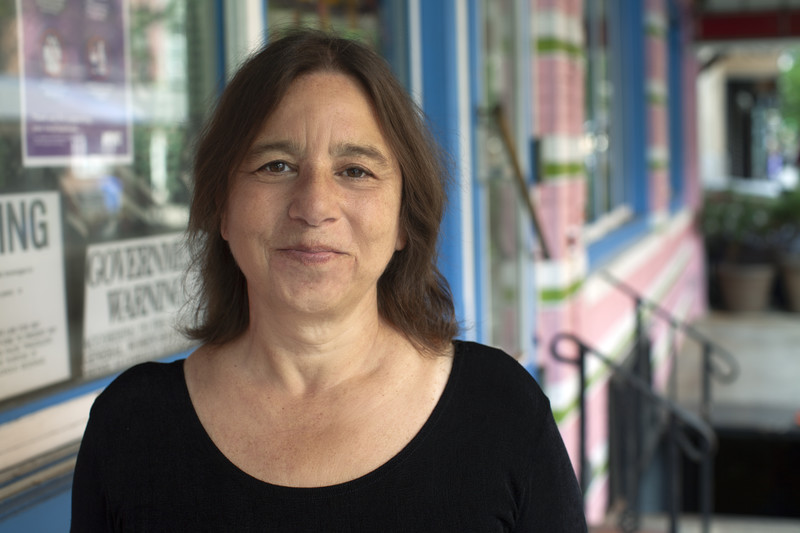France’s newspaper Libération was co-founded by Jean-Paul Sartre in the wake of the radical protests of May 1968. Launched in 1973, it still prides itself on “taking the side of….

France’s newspaper Libération was co-founded by Jean-Paul Sartre in the wake of the radical protests of May 1968. Launched in 1973, it still prides itself on “taking the side of citizens and their rights against all forms of injustice and discrimination, individual and collective.”
Yet like many liberal institutions, that willingness to challenge the powerful on behalf of the oppressed seems to take a back seat when it comes to Palestine.
At least that’s what award-winning American author Sarah Schulman discovered after she was interviewed for Libération in early March, to mark the publication in French of her 2016 book Conflict is not Abuse.
Yet the interview has been killed by Libération, and Schulman was told that it was in part because of her criticism of Israel’s attacks on Gaza.
“Conflict is not Abuse is about a third about Palestine and specifically the war on Gaza in 2014,” Schulman told The Electronic Intifada. “It would be impossible to discuss the book without talking about Israeli cruelty and US support for this gross injustice.”
The Electronic Intifada has seen two versions of the interview write-up – a first draft and a final version. Libération’s ethics guide allows journalists to send the unpublished texts of interview write-ups to their subjects in order to verify accuracy.
Abusers claim to be victims
In the interview for Libération with freelance journalist Cyril Lecerf Maulpoix, Schulman explains the themes central to her book, particularly her exploration of restorative, inclusive and less punitive ways to resolve conflicts and achieve justice.
She argues that conflict is a struggle over power without which injustices cannot be overcome – even if the parties are unequal in their power and responsibility for a given situation. In a conflict, parties nonetheless still have the ability to act and interact, including by preventing a descent into violence.
Abuse, by contrast, is the exercise of power from above. It can be experienced in the personal or domestic sphere, but it also exists at a wider level: Racism, Islamophobia or anti-Semitism are systemic abuses that no individual can dismantle.
Schulman observes that abusers often seek to avoid accountability by reversing roles: They cast themselves as the victim while painting their disempowered victims as a dangerous threat.
Her examples include Michael Brown and Eric Garner, whose killings by American police in 2014 spurred the Black Lives Matter movement, and Israel’s violence against Palestinians.
“I wanted to show that from the most intimate scale to the geopolitical relationship between a state and a population, you can see the same paradigm, where in the context of a conflict the aggressor portrays themselves as having been attacked merely because someone resists them,” Lecerf Maulpoix’s final draft quotes Schulman saying.
As well as talking about Israel’s justification of its violence against Palestinians, Schulman extends this framework to France, where President Emmanuel Macron is currently waging a war on the country’s beleaguered Muslim minority, under the banner of defending laïcité – secularism – against the specter of Islamo-gauchisme – “Islamo-Leftism” – and alleged Muslim separatism.
“We are living through a very repressive period, where the fascists are spreading everywhere and the aggressors are claiming to be victims because change is underway,” Schulman is quoted saying in the first draft.
“We can also see this in France in the panic about Islamo-Leftism,” she adds, noting with evident irony, “I suppose that I am a Jewish Islamo-Leftist.”
All this was apparently too much for Libération.
“Too radical”
A week ago – some three weeks after the interview – Schulman received an apologetic message from Lecerf Maulpoix.
“After two different versions sent, the editor of the rubrique Idées [the Ideas section] decided not to publish the interview in the end for reasons that I still find complicated to understand,” Lecerf Maulpoix wrote.
“Some are from what I gather political (about elements they find too radical, the role of the police, Israel and Gaza),” he added.
The journalist wrote Schulman of his frustration at his inability to meet the editors’ demands, despite “some rewriting to fit to their perspectives.”
Both of the drafts seen by The Electronic Intifada, which are in French, are well-written and convey Schulman’s ideas clearly and concisely.
The final version still mentions Israel and Gaza, though overall it is arguably somewhat toned down – perhaps a reflection of the journalist’s unsuccessful efforts to appease the newspaper.
Cécile Daumas, Ideas section editor of Libération, did not respond to The Electronic Intifada’s requests for comment.
Absent an explanation from the newspaper, Schulman is left to reach her own conclusions.
“I know that there are international efforts to falsely equate criticism of Israel and support of Palestinian rights with anti-Semitism, and I assume that Libération fell into that swamp,” she told The Electronic Intifada.
“Every day we hear about people who are Palestinian or who stand with Palestine being silenced, and this repression is on the upswing.”
